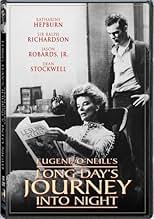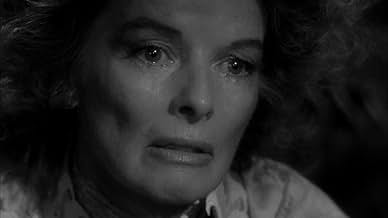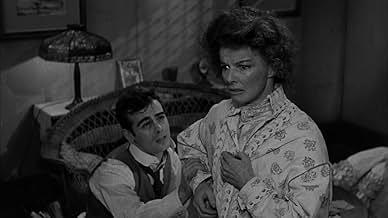À la fin d'une longue et chaude journée d'été, les membres d'une même famille se réunissent dans une grande maison. Tout le monde a quelque chose de douloureux et d'offensant à dire, et leur... Tout lireÀ la fin d'une longue et chaude journée d'été, les membres d'une même famille se réunissent dans une grande maison. Tout le monde a quelque chose de douloureux et d'offensant à dire, et leur silence est encore pire.À la fin d'une longue et chaude journée d'été, les membres d'une même famille se réunissent dans une grande maison. Tout le monde a quelque chose de douloureux et d'offensant à dire, et leur silence est encore pire.
- Réalisation
- Scénario
- Casting principal
- Nommé pour 1 Oscar
- 5 victoires et 5 nominations au total
Avis à la une
This story is a study in how humans lose themselves in the fog of drugs, alcohol, sex, disease, and other escapes from reality. None of the characters is willing to take responsibility for what is happening, and therefore they drift deeper and deeper into the night. The real horror is the fact that they could save themselves, but they never come out of the past or the fog long enough to take the first step.
The emotional impact of the play is incredibly powerful even as it is underplayed. This is one of the few films of a play that really works well and translates the emotions of the stage onto the screen without losing the depth and the catharsis.
The matriarch of this family is a drug addict who loves her family dearly. But she also resents them for various reasons: her husband for being a miser & cheating on her, her elder son for being jealous and infecting his younger sibling in childhood (the sibling died of the infection) and her youngest son for the complications surrounding his birth, which led to her addiction. The family too loves her in return but resent her for not having enough strength and self-discipline to overcome the addiction, even though they also indulge in overdrinking! The father resents his sons for being lazy and often compares their 'privileged' upbringing to his own miserable upbringing. His absolute fear of poverty makes him unable to provide proper medical assistance to his family. Besides resenting his parents for their obvious failings, the elder son resents his youngest brother for being better liked by the parents & also for being more talented than him. And if you thought that the matters could not get any worse, the youngest son is diagnosed with TB! This family, which was already doing very poorly, is shaken to its core. And all you can do as a viewer is listen to each and every member & sympathize because they have all reached a point of no return. There is equal parts love & hate in their relationships & even the viewer can see that not much can be done to avoid further heart break & alienation that is soon to follow.
But the brilliant acting in this film version of "Long Day's Journey" - especially the delicately nuanced work of Katharine Hepburn as the mother and a sensitive performance by Dean Stockwell as the younger son - shows me what a magnificent playwright O'Neill was. At times this tragic play seems almost Shakespearean.
Le saviez-vous
- AnecdotesAt one point during rehearsals, director Sidney Lumet felt that Sir Ralph Richardson wasn't really getting the proper measure of his character, James Tyrone. Lumet took Richardson aside and launched into a 45-minute lecture about his character's motivations. Richardson finally stopped him by saying "I see what you mean, dear boy, a little more cello, a little less flute." Lumet confessed to being enormously impressed with this way of expressing it.
- GaffesIn the climatic final scene as Mary wanders about her empty house, the shadow of a crew member is visible in the room.
- Citations
James Tyrone: [Edmund has just recited a piece of poetry] You recite it well... Who wrote it?
Edmund Tyrone: Baudelaire.
James Tyrone: [Dismissively] Never heard of him. Where you get your taste in authors...
James Tyrone: [Motioning to Edmund's bookshelves] This damned library of yours: Voltaire and Rousseau and Schopenhauer. And Ibsen... Atheists, fools and madmen! And your poet, this... "Baudelaire." And Swinburne, and Oscar Wilde. Whitman and Poe... Whoremongers and degenerates! When I've got three good sets of Shakespeare there you can read...
Edmund Tyrone: They say he was a souse, too.
James Tyrone: They lie. I don't doubt he liked his glass - it's a good man's failing - but he knew how to drink that it didn't poison his mind with morbidness and filth. Don't compare him with the pack you've got here. Your dirty Zola. And your...
James Tyrone: [Picking up one of Edmund's books and dismissively flipping through the pages] ... Dante Gabriel Rossetti, who was a dope fiend, a... hmm.
Edmund Tyrone: [Bemused at his father's sudden discomfort] Perhaps it would be wise to change the subject.
- Versions alternativesSome prints of "Long Day's Journey Into Night" run 136 minutes, and are missing a number of scenes in the first 1/3 of the film, including the original opening scene, and a long exterior scene between Ralph Richardson and Jason Robards, containing dialogue crucial to the understanding of Katharine Hepburn's character.
- ConnexionsFeatured in Katharine Hepburn: All About Me (1993)
Meilleurs choix
- How long is Long Day's Journey Into Night?Alimenté par Alexa
Détails
- Date de sortie
- Pays d’origine
- Langue
- Aussi connu sous le nom de
- Long Day's Journey Into Night
- Lieux de tournage
- 21 Tier Street, City Island, Bronx, New York City, New York, États-Unis(house in Connecticut - exteriors only)
- Société de production
- Voir plus de crédits d'entreprise sur IMDbPro
Box-office
- Budget
- 500 000 $US (estimé)
- Montant brut mondial
- 11 $US
- Durée2 heures 54 minutes
- Couleur
- Mixage
- Rapport de forme
- 1.85 : 1
Contribuer à cette page

























